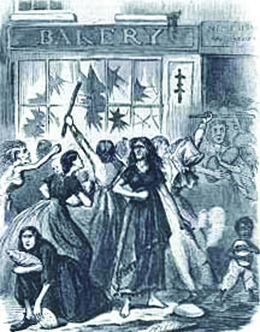| << Chapter < Page | Chapter >> Page > |
The war efforts were costing the new nation dearly. Nevertheless, the Confederate Congress heeded the pleas of wealthy plantation owners and refused to place a tax on slaves or cotton, despite the Confederacy’s desperate need for the revenue that such a tax would have raised. Instead, the Confederacy drafted a taxation plan that kept the Southern elite happy but in no way met the needs of the war. The government also resorted to printing immense amounts of paper money, which quickly led to runaway inflation. Food prices soared, and poor, white Southerners faced starvation. In April 1863, thousands of hungry people rioted in Richmond, Virginia ( [link] ). Many of the rioters were mothers who could not feed their children. The riot ended when President Davis threatened to have Confederate forces open fire on the crowds.

One of the reasons that the Confederacy was so economically devastated was its ill-advised gamble that cotton sales would continue during the war. The government had high hopes that Great Britain and France, which both used cotton as the raw material in their textile mills, would ensure the South’s economic strength—and therefore victory in the war—by continuing to buy. Furthermore, the Confederate government hoped that Great Britain and France would make loans to their new nation in order to ensure the continued flow of raw materials. These hopes were never realized. Great Britain in particular did not wish to risk war with the United States, which would have meant the invasion of Canada. The United States was also a major source of grain for Britain and an important purchaser of British goods. Furthermore, the blockade made Southern trade with Europe difficult. Instead, Great Britain, the major consumer of American cotton, found alternate sources in India and Egypt, leaving the South without the income or alliance it had anticipated.
Dissent within the Confederacy also affected the South’s ability to fight the war. Confederate politicians disagreed over the amount of power that the central government should be allowed to exercise. Many states’ rights advocates, who favored a weak central government and supported the sovereignty of individual states, resented President Davis’s efforts to conscript troops, impose taxation to pay for the war, and requisition necessary resources. Governors in the Confederate states often proved reluctant to provide supplies or troops for the use of the Confederate government. Even Jefferson Davis’s vice president Alexander Stephens opposed conscription, the seizure of slave property to work for the Confederacy, and suspension of habeas corpus. Class divisions also divided Confederates. Poor whites resented the ability of wealthy slaveholders to excuse themselves from military service. Racial tensions plagued the South as well. On those occasions when free blacks volunteered to serve in the Confederate army, they were turned away, and enslaved African Americans were regarded with fear and suspicion, as whites whispered among themselves about the possibility of slave insurrections.

Notification Switch
Would you like to follow the 'U.s. history' conversation and receive update notifications?